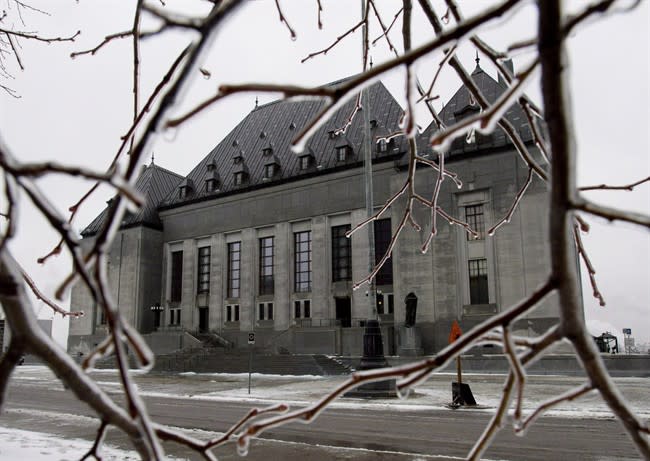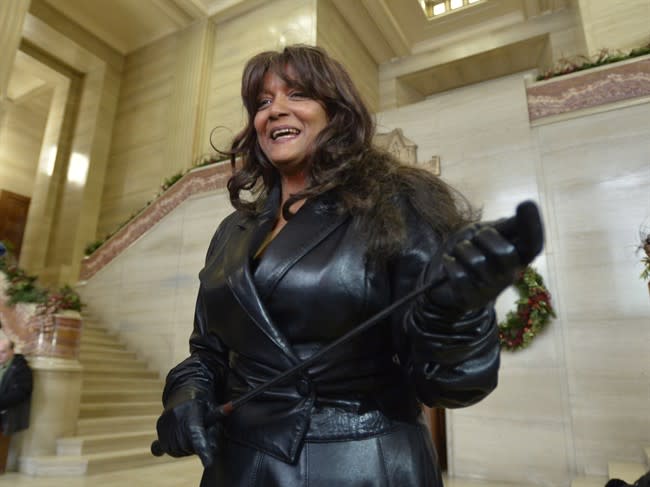Supreme Court strikes down Canada's anti-prostitution laws as Charter breach
OTTAWA - The Supreme Court of Canada started the clock ticking Friday for Parliament to reshape social policy dealing with the world's oldest profession, as political battle lines were drawn.
In a unanimous 9-0 ruling on Friday, the high court struck down the country's prostitution laws, giving Parliament a year to produce new legislation. That means prostitution-related offences will remain in the Criminal Code for one more year.
Justice Minister Peter MacKay said the government was "concerned" by the ruling, and is "exploring all possible options to ensure the criminal law continues to address the significant harms that flow from prostitution to communities, those engaged in prostitution, and vulnerable persons."
Meanwhile, Employment Minister Jason Kenney raised the spectre of judicial activism — saying legislators, not judges, should be making the law. It's a topic Prime Minister Stephen Harper has complained about as recently as this week.
"My own view is the judiciary should be restrained of the exercise of overturning a democratic consensus. Having said that we of course respect the independence of the judiciary and its role," said Kenney.
The high court struck down all three prostitution-related prohibitions — against keeping a brothel, living on the avails of prostitution and street soliciting — as violations of the constitutional guarantee to life, liberty and security of the person.
The ruling comes more than two decades after the court last upheld the anti-prostitution laws. It represents a historic victory for sex workers — mainly women — who were seeking safer working conditions.
Advocates for sex workers asked for a seat at the table in the coming year as the government crafts a response. But they and their advocates were skeptical that the Harper Conservatives, known for their tough-on-crime agenda, would be receptive.
The Evangelical Fellowship of Canada has the ear of the government, proposing to criminalize pimps and johns, but not prostitutes themselves. That makes the church group an unlikely ally of the Women's Coalition for the Abolition of Prostitution, which backs this so-called "Nordic model" that has found favour in Sweden, Norway and Iceland.
That pairs those two groups against the sex workers who won Friday's case and who are calling for all-out decriminalization.
"Our fate should not be decided by the church. We are a secular nation," said former prostitute Valerie Scott of Toronto, one of three principals in the case, along with retired dominatrix Terri-Jean Bedford and Vancouver sex worker Amy Lebovitch.
Chief Justice Beverley McLachlin, writing on behalf of the court, noted that Canada's social landscape has changed since the last time the high court considered this issue in 1990.
"These appeals and the cross-appeal are not about whether prostitution should be legal or not," she wrote. "They are about whether the laws Parliament has enacted on how prostitution may be carried out pass constitutional muster.
"I conclude that they do not."
In the 1990 reference, the Supreme Court upheld a ban on street solicitation, but the two women justices on the court at that time dissented.
This time, all six male Supreme Court justices sided with their three female colleagues.
The decision upheld last year's Ontario Court of Appeal ruling that said the law banning brothels exposed sex workers to added danger by forcing them onto the streets.
"The harms identified by the courts below are grossly disproportionate to the deterrence of community disruption that is the object of the law," McLachlin wrote.
"Parliament has the power to regulate against nuisances, but not at the cost of the health, safety and lives of prostitutes."
Sex-trade workers argued that much has changed since the high court last considered prostitution, including the horrific serial killings of prostitutes by Robert Pickton in British Columbia.
The Supreme Court appeared to acknowledge the Pickton case in the ruling, saying: "A law that prevents street prostitutes from resorting to a safe haven such as Grandma's House while a suspected serial killer prowls the streets, is a law that has lost sight of its purpose."
The court also struck down the law that makes living on the avails of prostitution illegal, rejecting the Ontario government's argument that it is designed "to target the commercialization of prostitution and to promote the values of dignity and equality."
As for communication for the purposes of prostitution, the high court noted that the law is not intended to eliminate prostitution, but to take it out of public view so it will not be seen as a nuisance.
In weighing that balance, the high court concluded "that the harm imposed by the prohibition on communicating in public was grossly disproportionate to the provision's object of removing the nuisance of prostitution from the streets."
Parliament could ask the Supreme Court for an extension on the effect of the ruling, if it has tabled legislation but can't meet the one-year deadline.
The ruling advised Parliament it needs to reshape the legal framework around prostitution.
"That does not mean that Parliament is precluded from imposing limits on where and how prostitution may be conducted," it said.
"Greater latitude in one measure — for example, permitting prostitutes to obtain the assistance of security personnel — might impact on the constitutionality of another measure — for example, forbidding the nuisances associated with keeping a bawdy-house.
"The regulation of prostitution is a complex and delicate matter. It will be for Parliament, should it choose to do so, to devise a new approach, reflecting different elements of the existing regime."
The lawyer for the victorious sex workers, Toronto law professor Alan Young, hailed the ruling as "a resounding victory for the rule of law, and a victory for liberty and security of the person and finally a long overdue recognition that sex workers are deserving of equal protection of the law."
But he said he was not confident that the current Conservative government would craft an adequate legal response.
Bedford, clad in her trademark long black-leather coat, cracked her whip, mugged for cameras in the vast granite foyer of the Supreme Court and mocked the Tories, as she has done in the past.
"Now, the government must tell all consenting Canadians, all consenting adults, what we can and cannot do in the privacy of our home, for money or not, and they must write laws that are fair," said Bedford.
Young said all those affected by the law should come forward to consult with the government in the coming year.
Scott said politicians don't understand "how sex work, works" and should consult meaningfully with those in the trade in the coming year. "They won't be able to write a half-decent law. It will fail," she said.
Don Hutchinson, vice president of the Evangelical Fellowship of Canada, said it should still be a crime for pimps and clients to be prosecuted, but not prostitutes.
"Our proposal is to bring clarity to the issue," he said.
"Yes, there have been conversations with the Justice Department and with others in the government."
Scott said she does not want the government to adopt the "failed and extremely dangerous Nordic model," that has resulted in violence against women in some countries.
"The effects are just the same as the old regime we have in Canada."
— with files from Bill Graveland in Calgary



